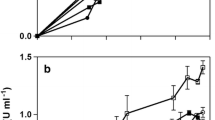Abstract
The biocatalytic synthesis of acrylic acid from acrylamide by the Rhodococcus erythropolis 4-1 and Alcaligenes faecalis 2 strains with amidase activity is studied. The optimum pH values are 6–7 for R. erythropolis 4-1 and 7–7.5 for A. faecalis 2, while the optimum temperature is 20–50°С for both strains. The optimum acrylamide concentration is 150 mM for R. erythropolis 4-1 and 250 mM for A. faecalis 2. The synthesis of acrylic acid with fractional additions of a substrate catalyzed by the biomass of A. faecalis 2 is more effective than using R. erythropolis 4-1. The biocatalyst is best stored at −20°C. The amidase activity of A. faecalis 2 cells immobilized on chitosan activated with glutaraldehyde and non-activated chitosan did not decline during the storage of either wet or dried granules.





Similar content being viewed by others
REFERENCES
Wang, X., Wang, H., and Sun, Y., Chem., 2017, vol. 3, no. 2, pp. 211–228.
Li, C., Zhu, Q., Cui, Z., Wang, B., Fang, Y., and Tan, T., Chem. Eng. Sci., 2018, vol. 183, pp. 288–294.
Manzini, S., Huguet, N., Trapp, O., Paciello, R.A., and Schaub, T., Catal. Today, 2017, vol. 281, part 2, pp. 379–386.
Hollering, M., Dutta, B., and Kühn, F.E., Coord. Chem. Rev., 2016, vol. 309, pp. 51–67.
Rasteiro, L.F., Vieira, L.H., Possato, L.G., Pulcinelli, S.H., Santilli, C.V., and Martins, L., Catal. Today, 2017, vol. 296, pp. 10–18.
Xu, X., Lin, J., and Cen, P., Chin. J. Chem. Eng., 2006, vol. 14, no. 4, pp. 419–427.
Zhang, X., Lin, L., Zhang, T., Liu, H., and Zhang, X., Chem. Eng. J., 2016, vol. 284, pp. 934–941.
Shen, M., Zheng, Y.-G., and Shen, Y.-C., Process Biochem., 2009, vol. 44, no. 7, pp. 781–785.
Poltavskaya, S.V., Kozulina, T.N., Singirtsev, I.N., Kozulin, S.V., Shub, G.M., and Voronin, S.P., Biotekhnologiya, 2004, no. 1, pp. 62–70.
RF Patent 2337954, 2008.
Maksimova, Yu.G., Maksimov, A.Yu., Demakov, V.A., Kozlov, S.V., Ovechkina, G.V., and Olontsev, V.F., Appl. Biochem. Microbiol., 2011, no. 47, pp. 681–687.
Maksimova, Yu.G., Demakov, V.A., and Ovechkina, G.V., Vestn. Biotekhnol. Fiz.-Khim. Biol. im. Yu.A. Ovchinnikova, 2011, vol. 7, no. 2, pp. 5–10.
Dawson, R., Elliott, D., Elliott, W., and Jones, K., Data for Biochemical Research, Oxford: Clarendon Press, 1986.
Joshi, S.J. and Abed, R.M.M., Environ. Processes, 2017, vol. 4, no. 2, pp. 463–476.
Zödl, B., Schmid, D., Wassler, G., Gundacker, C., Leibetseder, V., Thalhammer, T., and Ekmekcioglu, C., Toxicology, 2007, vol. 232, nos. 1–2, pp. 99–108.
Ermilova, E.V., Molekulyarnye aspekty adaptatsii prokariot (Molecular Aspects of Prokaryote Adaptation), St. Petersburg: St. Petersburg Univ., 2007.
Maksimova, Yu.G., Vasil’ev, D.M., Zorina, A.S., Ovechkina, G.V., and Maksimov, A.Yu., Appl. Biochem. Microbiol., 2018, vol. 54, no. 2, pp. 173–178.
Thakur, N., Kumar, V., Sharma, N.K., Thakur, S., and Bhalla, T.C., Protein Pept. Lett., 2016, vol. 23, no. 2, pp. 152–158.
Glinskii, S.A., Kozulin, S.V., Kozulina, T.N., Poltavskaya, S.V., Yanenko, A.S., and Leonova, T.E., Biotekhnologiya, 2010, no. 1, pp. 17–24.
Funding
This work was performed as part of state task no. 01201353249.
Author information
Authors and Affiliations
Corresponding authors
Ethics declarations
COMPLIANCE WITH ETHICAL STANDARDS
This work did not involve any research using animals as objects.
CONFLICT OF INTEREST
The authors declare there was no conflict of interest.
Additional information
Translated by A. Bulaev
Rights and permissions
About this article
Cite this article
Maksimova, Y.G., Yakimova, M.S. & Maksimov, A.Y. Biocatalysts Based on Bacterial Cells with Amidase Activity for the Synthesis of Acrylic Acid from Acrylamide. Catal. Ind. 11, 264–270 (2019). https://doi.org/10.1134/S2070050419030073
Received:
Revised:
Accepted:
Published:
Issue Date:
DOI: https://doi.org/10.1134/S2070050419030073



